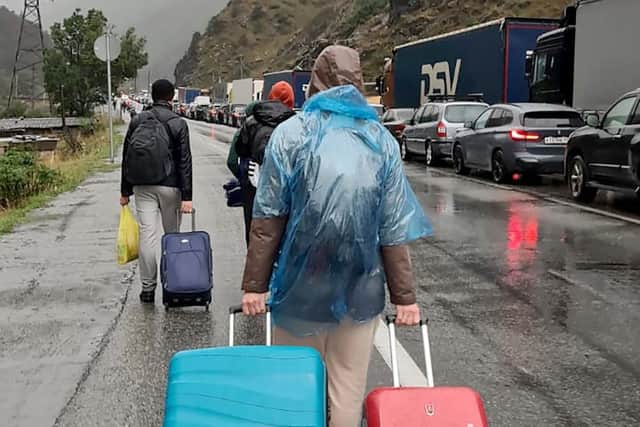War in Ukraine: The problematic question of Russia's 'refugees'
When Ukrainians began to leave in the thousands after war broke out, neighbouring countries opened their borders – and their hearts – to those seeking safety.
Yet the latest wave of migrants are not likely to receive the same warm reception. Thousands of Russians have gathered at borders since president Vladimir Putin announced a “partial mobilisation” in the country’s war against Ukraine last week.
Advertisement
Hide AdAdvertisement
Hide AdThe move is a significant escalation of hostilities for ordinary Russians, most of whom have been, up until now, fairly unaffected by the conflict. Aside from professional soldiers, the worst effects of the war for many have been predominantly economic and lifestyle-related due to Western sanctions.


Now, they could find themselves called up to fight on the front line of a war. It is one thing to turn a blind eye to hostilities when they are occurring abroad; another to potentially lay your own life – or that of your son or daughter – on the line for a cause.
Some who are trying to leave claim they are conscientious objectors. Others are anti-war protesters who fear they and their families will be badly treated by the Russian Government.
Many will be simply running scared of a brutal and bloody conflict which they know will claim many lives. Yet they are all still citizens of an aggressor nation, which the West sees as a major threat and which is an all-out enemy for Ukraine.
The question remains – are they refugees and, if so, should they be treated as such? Should refugee reception centres be opened for them? Should humanitarian aid be handed out? Should nations, including Britain, be considering launching a visa programme for those fleeing conflict at home in Russia? This seems unlikely.
Countries in the European Union are reportedly working together to establish a common stance on Russians seeking refuge. However, some, including Finland, Latvia, Lithuania and Estonia, have already taken a hard line – they will no longer allow Russians to enter.
It is a moral dilemma which the continent’s interior ministers will be struggling to grapple with. What they decide will make for interesting reading.
Comments
Want to join the conversation? Please or to comment on this article.
